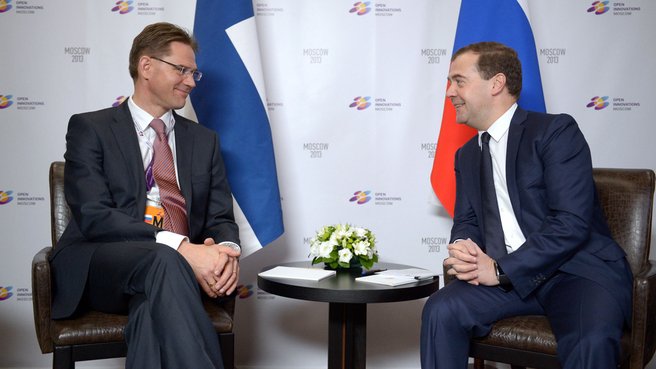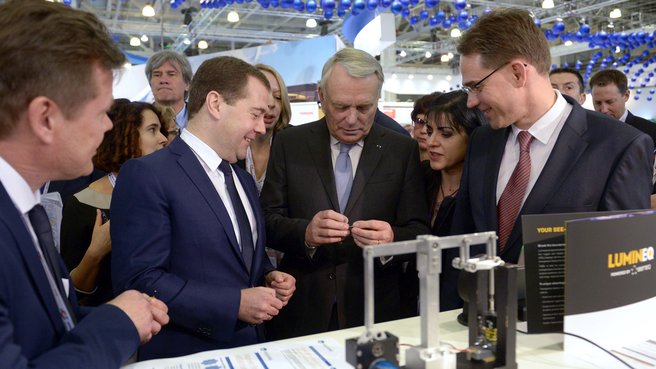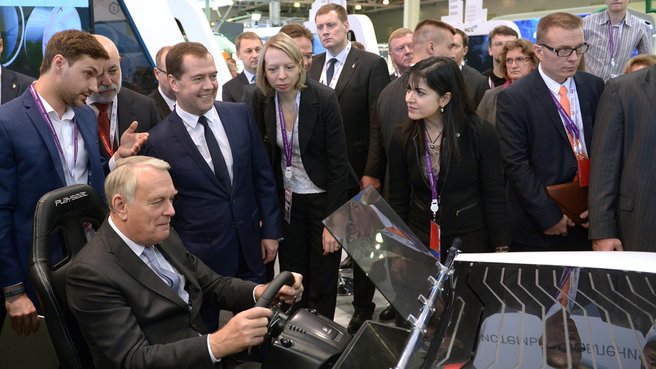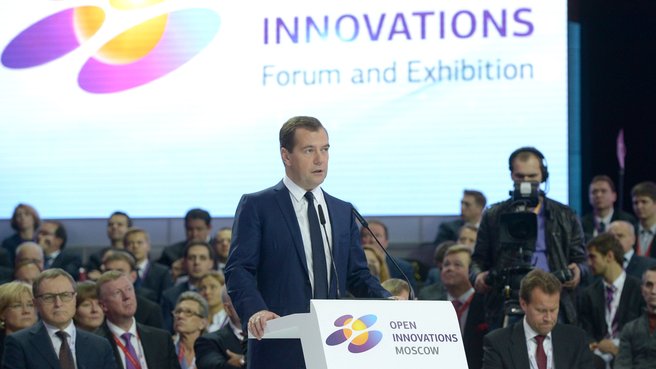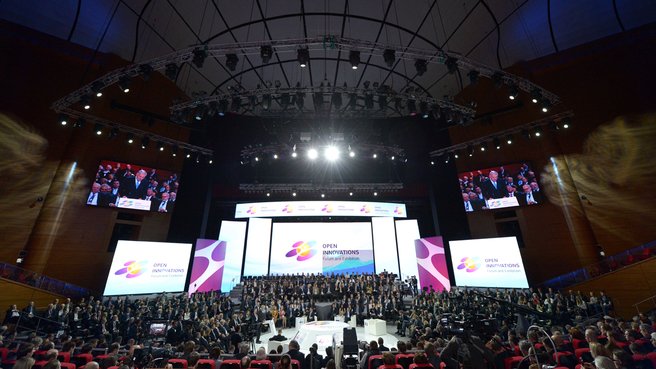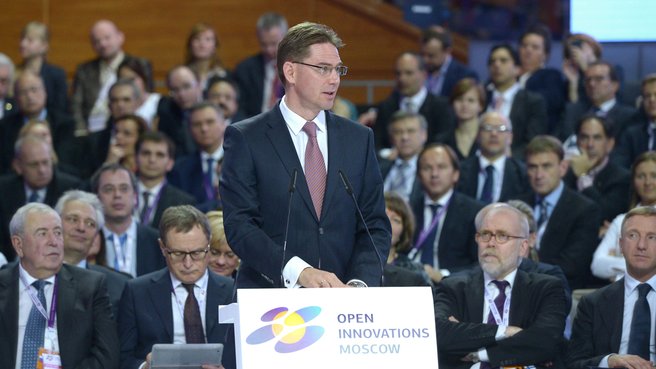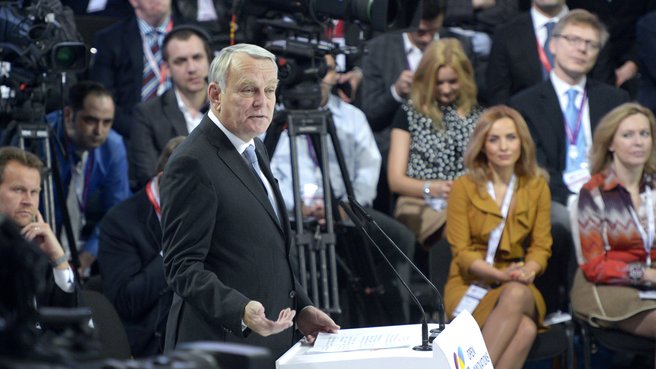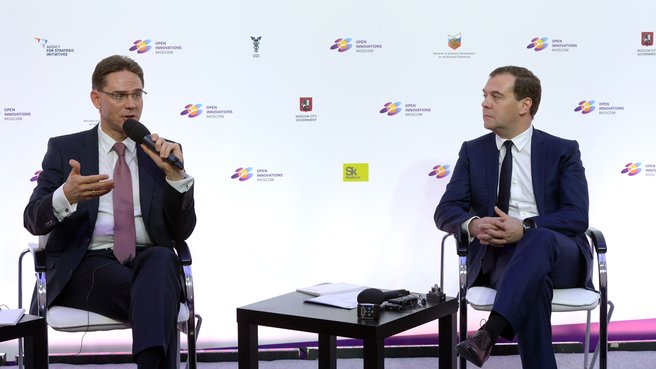“We have approved a Strategy of Russia’s Innovation Development to 2020 and expect that its implementation will result in innovations adding about one percentage point to our economic growth, starting from 2015.”
Prime Minister Dmitry Medvedev meets with Prime Minister Jyrki Katainen of Finland
Touring the Open Innovations Expo – 2013
Prime Minister Dmitry Medvedev addresses the plenary meeting of the Open Innovations forum
Before the plenary meeting, Prime Minister Dmitry Medvedev met with Prime Minister Jyrki Katainen of Finland.
Transcript of the beginning of the meeting:
Dmitry Medvedev: Mr Prime Minister, I am very glad to see you. Thank you for accepting the invitation to participate in our Open Innovations forum. This is a good occasion to discuss our bilateral affairs and the economy. The situation is not very optimistic right now, but, on the other hand, it is under such circumstances that countries should promote international cooperation.
Jyrki Katainen: Mr Prime Minister, thank you for your invitation. I am very glad to be here. Finland is very grateful and appreciates the fact that we can be present here as a partner country. We have a great deal in common, including cooperation in the Arctic, and in the shipbuilding industry and the maritime industry in general. Innovation in this area is critically important.
<…>
* * *
Dmitry Medvedev tours the Open Innovations Expo – 2013
As part of the 2nd Moscow International Forum Open Innovations, Russian Prime Minister Dmitry Medvedev, Finnish Prime Minister Jyrki Katainen and French Prime Minister Jean-Marc Ayrault reviewed the latest designs and developments of Russian and foreign companies at the Open Innovations Expo – 2013.
Dmitry Medvedev watched a demonstration of how the Russian-made GLONASS system works.
RUSNANO head Anatoly Chubais told Dmitry Medvedev that RUSNANO jointly with Crocus Technology (France) have opened a clean room to begin mass production of electronics based on the concept of magnetic memory for the first time in the world. According to Mr Chubais, “this is an alternative technology which is multiple times more compact and energy-efficient than the traditional technology and multiple times quicker.”
Dmitry Medvedev reviewed the stand of WayRay (Russia), which, with the support from the Skolkovo Foundation, has developed a new type of navigation system that can project the screen image on any glass surface in an automobile. This allows drivers to view maps and directions on the windshield, which is safer.
The Prime Minister visited a virtual shoe store that uses algorithms to 3D-model feet and shoe interiors. He also reviewed a mobile app for early disease detection: by simply touching the mobile screen with two fingers, the state-of-the-art device can take a cardiogram.
Dmitry Medvedev also toured several French stands, including that of Schneider Electric, which specialises in energy saving technology.
* * *
Dmitry Medvedev’s address to the plenary meeting:
Ladies and gentlemen, colleagues, Mr Katainen (Prime Minister Jyrki Katainen of Finland), Mr Ayrault (Prime Minister Jean-Marc Ayrault of France), the first thing I heard was: What can governments do to support innovation? I think the most important thing is just to avoid interfering with the normal course of events.
It is a great honour and responsibility for us to host this representative forum. This is the second occasion on which many leaders of the innovation sphere – politicians, businessmen and scientists, who are people that actually shape the vector of global development – have come to Moscow.
Last year’s forum addressed the prospects for the innovation system that we are creating and support for this system. The discussion resulted in concrete measures aimed at bolstering the efficiency of development institutions and strengthening our partner relations with many companies and scientific centres. Let me once again thank everyone for this. But the world has certainly changed during this year. Technological progress creates not only new opportunities but also new challenges. As a rule, these require a joint response. We suggest that innovation activity should be regarded as a positive-sum game, where all participants derive the maximum gain precisely from a strategy of cooperation. There can be no isolationism here, because it leads nowhere.
The goal is to get a general idea of future technology. I think that very few people can accurately predict future development trends, especially since most new developments are associated with significant risks, and some issues that we are discussing today involve expenditures that would be extremely risky even for venture investors. However, in each of these areas, we can create new markets and change the traditional understanding of how the production and marketing of these new products should be organised.
Dmitry Medvedev: “Technological progress creates not only new opportunities but also new challenges. As a rule, these require a joint response. We suggest that innovation activity should be regarded as a positive-sum game, where all participants derive the maximum gain precisely from a strategy of cooperation.”
Colleagues, from the outset, the Moscow forum has been conceived as an international platform. This year’s event is being held in partnership with France and Finland, and I would like to thank once again prime ministers Jean-Marc Ayrault and Jyrki Katainen for kindly accepting my invitation.
There is significant interest in innovation cooperation between our countries. With France, we have strong ties in the nuclear and aerospace industries. Over 470 French companies work on the Russian market in various industries. We have been cultivating partnerships between the two countries’ technology and innovation clusters.
We have been traditionally closely cooperating with our friends and neighbours in Finland, particular in nanotechnology – we’ve just seen some of the results of this cooperation – telecommunications, biotechnology, and medical technology. There is also effective cooperation between our development institutions.
And now a few words about what we have been doing recently. Naturally, we have been trying to use the best foreign experience, including that of France and Finland, to create our own innovative structure. We have invested substantial funds in this structure worth hundreds of billions of roubles.
However, we must ensure that each element of this infrastructure is used to achieve a specific objective, moving the project forward at all stages of the innovation cycle – which, as we know, is quite difficult. We need to make sure that the entire back-up system is efficient from the emergence of the original plan to the production and marketing of the innovative product.
And we must admit that this is where we have faced the most difficulties so far. However, we believe that a self-sufficient industry will eventually emerge to generate a flow of commercially viable projects, and any start-up entrepreneur in this industry will be able to determine the range of support measures best suited for his or her business.
The Russian Startup Tour is one of those promising projects that I would like to mention. It has brought together young high-tech entrepreneurs from different regions of our country and abroad. Next year, under the auspices of this project, they will visit 25 cities in Russia, from Vladivostok to St. Petersburg.
We have approved Russia’s innovative development strategy until 2020. It is probably the objective of any government to outline future development plans. We expect that by 2015 the implementation of this strategy will be adding a percentage point to our economic growth.This is an ambitious goal, but hopefully we’ll be able to achieve it. We are also working to improve our legislation, making it more modern and suited to venture investment, and trying to use international experience to this end.
There is one issue that unfortunately has been very challenging for Russia for a long time. I am referring to intellectual property rights. However, I believe that we have made significant progress in this area lately. Most recently, we launched a specialised court for intellectual property rights and are planning to create additional regulating agencies in the future.
Dmitry Medvedev: “We have approved Russia’s innovative development strategy until 2020. It is probably the objective of any government to outline future development plans. We expect that by 2015 the implementation of this strategy will be adding a percentage point to our economic growth.”
I would like to add a few words about information technology. Just a week ago, the Government approved the IT-sector development strategy. This industry is very promising for our country and can help to increase effectiveness in many spheres of life.
I believe that the great interdependence of the world has been made possible primarily through the use of the Internet and wireless technology in general. Today, the global Internet is not just a tool for sharing information between people, but also between devices, and this is a whole new development.
Many projects that seemed unreal in the past are becoming a reality today. Three-dimensional printers, which until recently were considered something completely extraordinary, are used actively almost everywhere now. The same is true regarding fully robotised production lines and numerous other developments. I have no doubt that this will contribute to the progress of humankind and make our lives more comfortable and convenient.
However, we should also realise that this leads to the increased vulnerability of the world. Thus, we need to work on improving the personal information security on the Internet and strengthen the protection of major infrastructure facilities, as our civilization is very technology dependent. Of course, there are problems with the digital divide, which also exists in Russia, but we are trying to overcome it… These problems result in increased disparity in the development of regions and entire countries.
I think that this is one of those issues that should always be on our agenda. I am convinced that this forum will help to find answers to a whole range of contemporary issues.
* * *
Dmitry Medvedev’s concluding remarks:
I agree with what my colleagues just said, but today we are talking about what to do and what our hyper-connectedness means in today’s world. I’ve discovered at least one example of this hyper-connectedness after the answer my colleague Mr Katainen gave. Hyper-connectedness means that Microsoft has become the symbol of Finnish innovation. I don’t see anything bad in this, just that Microsoft likely understood what it was doing when it bought Nokia – investing in a very important sector.
And one more thing. Mr Manyika (James Manyika, Director of McKinsey Global Institute) said that all leaders – of countries, governments, and businesses – should be tech-savvy. I completely agree with this because we are on the threshold of a new human civilization and we should act accordingly. If we don’t, we will end up making mistakes, both in business and government. So let’s make sure our actions are in line with what our focus is.
Thank you!
***
Prime Minister Dmitry Medvedev meets with participants in the 100 Innovators international project of the Open Innovations forum’s youth programme
The meeting was also attended by Prime Minister Jyrki Katainen of Finland.
In response to questions from forum participants, Dmitry Medvedev said, among other things, that the government was doing its best to convince major companies to work with startups and introduce innovations.
“We really think that, unfortunately, proper ties cannot be forged between innovation companies, startups and future consumers of relevant products and services unless the government sends the right signal to this effect,” the Prime Minister said. “Let me stress that this is true of Russia alone; the situation in other countries is somewhat different.”
“It is for this reason that we are drafting special regulatory directions on this issue and even defining the share of products that big companies – public companies, above all – should buy from small businesses, including from those dealing with innovations,” he added.
The Prime Minister stressed that in the future, he would like the system of cooperation between big companies, startups and innovators to operate automatically.
